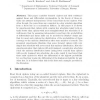Free Online Productivity Tools
i2Speak
i2Symbol
i2OCR
iTex2Img
iWeb2Print
iWeb2Shot
i2Type
iPdf2Split
iPdf2Merge
i2Bopomofo
i2Arabic
i2Style
i2Image
i2PDF
iLatex2Rtf
Sci2ools
124
click to vote
ESORICS
2004
Springer
2004
Springer
On the Role of Key Schedules in Attacks on Iterated Ciphers
This paper considers iterated ciphers and their resistance against linear and differential cryptanalysis. In the theory of these attacks one assumes independence of the round keys in the ciphers. Very often though, the round keys are computed in a key schedule algorithm from a short key in a nonrandom fashion. In this paper it is shown by experiments that ciphers with complex key schedules resist both attacks better than ciphers with more straightforward key schedules. It is well-known that by assuming independent round keys the probabilities of differentials and linear hulls can be modeled by Markov chains and that for most such ciphers the distribution of the probabilities of these converge to the uniform distribution after some number of rounds. The presented experiments illustrate that some iterated ciphers with very simple key schedules will never reach this uniform distribution. Also the experiments show that ciphers with well-designed, complex key schedules reach the uniform d...
Related Content
| Added | 01 Jul 2010 |
| Updated | 01 Jul 2010 |
| Type | Conference |
| Year | 2004 |
| Where | ESORICS |
| Authors | Lars R. Knudsen, John Erik Mathiassen |
Comments (0)

